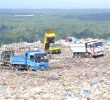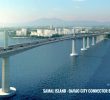MANILA, Philippines — �The Asian Development Bank will continue to fund climate change. The Bank will still invest in coal power plants inspite of its recognition that coal projects have serious environmental and health implications,� said Hemantha Withanage, executive director of NGO Forum on ADB.
In its draft energy strategy, which was released last 29 May to the public for commenting, the ADB stated that it will continue to support fossil fuel-based energy generation project, including coal-based power plants. Ironically, the Bank recognizes that coal projects generate greenhouse gas (GHG) and a number of other pollutants such as sulphur dioxide, nitrogen dioxide and heavy metals.
According to the United Nations Environment Programme (UNEP), continuous burning of fossil fuels contributes to increases in atmospheric concentration of GHG which lead to climate change. Asia and the Pacific will be the ones hardly hit by climate change as manifested lately by more intense tropical storms, more frequent flooding and rises in sea level, among others.
In addition, the Intergovernmental Panel on Climate Change (IPCC) states that if atmospheric carbon dioxide (CO2) concentration were to double, increasing global warming by 2 to 4.5�C as a result, developing countries will experience losses of 1-5% of its GDP.
Safe Technology?
In its draft strategy, the ADB insisted that it will adopt available cleaner technologies to mitigate the negative environmental harm and health hazards caused by coal projects. However, experiences in the past show that such mechanisms implored by the Bank have been proven futile.
In the Philippines, inspite of the preventive measures that were applied to the ADB-funded Masinloc Coal-Fired Power Plant, significant levels of mercury and fly ash particles were still found able to escape pollution control devices. Likewise, sample ashes from the Mae Moh Coal Power Plant in Thailand has continued to contain lead, mercury and other heavy metals inspite the installation of the ADB-endorsed flue gas desulfurization (FGD) and ionizing wet scrubber technologies.
Carbon Market Initiative
As an ongoing program, the ADB will also continue to implement its Carbon Market Initiative (CMI). According to the Bank, CMI aims to support sustainable development goals of its developing member countries (DMCs), address global climate change concerns and assist developed countries meet their emissions reduction commitments to the Kyoto Protocol.
Under the CMI, countries that are exceeding their required carbon emissions buy carbon credits from other countries who have unused them � also known as carbon trading � by providing funds for forest plantation and/or maintenance. Such plantations are assumed to absorb the excess carbon emissions of the buying country.
However, studies show that CMIs of the World Bank and European countries did not deliver the expected results. Most credit firms instead implement carbon-sequestering projects such as monoculture forest plantations rather than reducing GHGs which is the source of climate change. Critics say that this �lower hanging fruit� (convenient) approach has not reduced GHG in reality but has only given way to creative accounting and profit making.
Under its draft energy strategy, the ADB forecasts that coal and oil will still be the dominating energy sources even until 2030. Renewable energy will pay a very minimal role. According to the International Energy Agency, renewable energy only accounts to 9.6 percent of the total supply of energy. �If the ADB expects to efficiently and effectively use its carbon credits initiative to promote energy efficiency and renewables, and help reduce GHG emissions, the ADB should increase its investment in renewables. If it wants to help prevent the worsening climate change, the ADB should instead help increase renewables� contribution to global electricity production,� Withanage said.
Privatization of the power industry
Meanwhile on ADB�s privatization program of the energy sector, Ana Maria Nemenzo, president of Freedom from Debt Coalitions said, �A dark future awaits the people under the ADB�s restructuring and privatization of the power industry. ADB�s lending policy on the power sector is accompanied by aggressive promotion of private sector involvement.�
Nemenzo said, �While ADB claims that its power sector restructuring and privatization program is towards reducing poverty in the region, the opposite has been the result.� In the Philippines, privatization of the power industry has led to increasing power rates and increasing government debt, leading to further impoverishment of the poor. Moreover, many lost their jobs due to privatization. �Poverty has increased in countries where privatization has taken place, while the big corporate sector has been continuously amassing huge profit,� she added.
IMPORTANT NOTICE: INBOX is an archive of press releases, statements, announcements, letters to the editors, and manifestos sent to Davao Today for publication. Please email your materials to davaotoday @ gmail.com. Davao Today is not responsible for the content of these materials. The opinion expessed in these items does not reflect those of Davao Today and its staff. Please refer to our terms of use/disclaimer.










